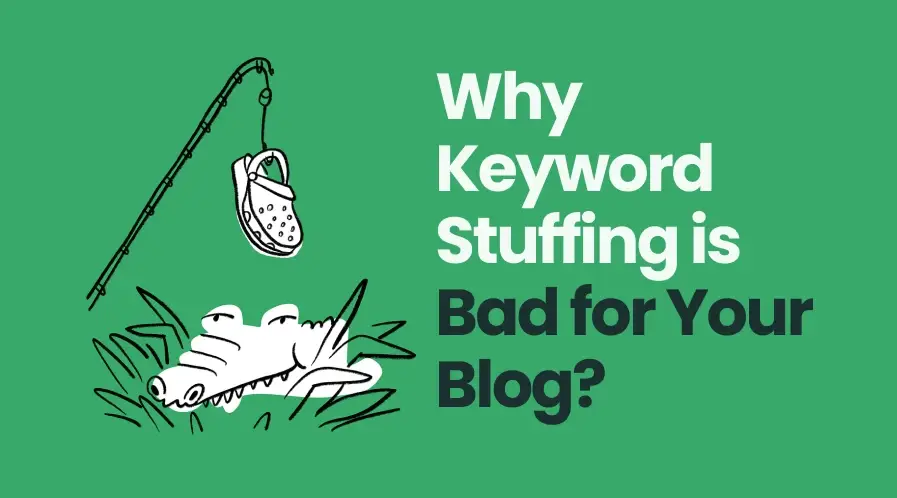In the world of SEO, there are strategies that can help you rank higher on search engines, and then there are tactics that can harm your website’s performance. One such harmful tactic is keyword stuffing.
In this article, we’ll explore what keyword stuffing is, how it impacts SEO, and why it’s important to avoid it. By the end, you’ll understand how to optimize your content effectively without falling into the trap of keyword stuffing.
What is Keyword Stuffing?
Keyword stuffing is the practice of overloading a webpage with keywords in an attempt to manipulate its ranking on search engines like Google.
This tactic involves repeating the same keyword or phrase unnaturally throughout the content.
The goal is to make the content appear more relevant to the search engines, but in reality, it often results in poor user experience and lower rankings.

Real-Life Example
Imagine reading an article about healthy breakfast recipes, and every other sentence includes the phrase healthy breakfast recipes. For example:
Looking for healthy breakfast recipes? Our healthy breakfast recipes are easy to make. These healthy breakfast recipes are perfect for your morning routine.
While the phrase healthy breakfast recipes are repeated several times, the content feels awkward and unnatural. This is a classic example of keyword stuffing.
How Does Keyword Stuffing Impact SEO?
Keyword stuffing might seem like an easy way to boost your rankings, but it often backfires. Let’s explore the specific ways this tactic can harm your SEO efforts.
Negative User Experience
When content is stuffed with keywords, it becomes difficult to read. Users visit your website for valuable information, not repetitive phrases.
If your content is hard to follow or feels forced, visitors are likely to leave your site quickly. This increases your bounce rate, which signals to search engines that your content is not relevant or valuable.
Lower Search Engine Rankings
Search engines, especially Google, have become smarter over the years. They can easily detect when a website is engaging in keyword stuffing.
Instead of rewarding this tactic, search engines penalize it. Websites that use keyword stuffing often see a drop in rankings, making it harder for potential visitors to find them.
Harm to Brand Reputation
Keyword stuffing not only affects your rankings but also your brand’s reputation.
If users find your content frustrating or spammy, they are less likely to trust your brand. This can lead to fewer return visitors, less engagement, and ultimately, lower conversions.
Why Do Some Websites Still Use Keyword Stuffing?
Despite the negative impact, some websites still use keyword stuffing, often due to outdated SEO practices or a lack of understanding of how search engines work.
Some website owners believe that by repeating a keyword multiple times, they will rank higher. However, this is a misconception. Modern SEO focuses on quality content, user experience, and natural keyword usage.
The Evolution of Search Engines
Search engines like Google have evolved significantly over the years. In the early days of SEO, keyword stuffing was a common practice because search engines were not as sophisticated.
They relied heavily on keyword frequency to determine a page’s relevance. However, as search engines became more advanced, they started prioritizing user experience, content quality, and relevance over keyword frequency.
Example of Evolution
In the past, if you searched for “best smartphones,” the top results might have been pages stuffed with the phrase “best smartphones.” Today, search engines consider factors like user intent, content quality, and page authority. As a result, the top results are likely to be comprehensive guides or reviews that provide real value to the user.
How to Avoid Keyword Stuffing
To avoid keyword stuffing, focus on creating content that is valuable, informative, and natural. Here are some tips:
1. Use Synonyms and Related Terms
Instead of repeating the same keyword, use synonyms or related phrases. For example, if your focus keyword is “keyword stuffing,” you can also use terms like “overuse of keywords” or “keyword overloading.”
2. Write for Humans, Not Search Engines
Always prioritize your audience when writing content. Ask yourself, “Does this content provide value to my readers?” If the answer is yes, then you’re on the right track. Search engines now reward content that is useful and engaging for users.
3. Follow a Natural Flow
Your content should flow naturally. Don’t force keywords into sentences where they don’t fit. Instead, let them appear naturally as part of the conversation.
4. Use LSI Keywords
Latent Semantic Indexing (LSI) keywords are terms related to your main keyword. They help search engines understand the context of your content.
For example, if your main keyword is “keyword stuffing,” LSI keywords could include “SEO penalties,” “Google ranking factors,” and “SEO best practices.”
5. Monitor Keyword Density
While there’s no specific percentage for keyword density, aim for a balanced approach.
A good rule of thumb is to keep your keyword density between 1–2%. This means your keyword should appear naturally without overwhelming the content.
Real-Life Example of Good SEO Practice
Let’s say you’re writing an article about “digital marketing strategies.”
Instead of stuffing the keyword “digital marketing strategies” throughout the content, you might use it a few times and include related terms like “online marketing techniques,” “SEO tactics,” and “social media marketing.”
This approach not only avoids keyword stuffing but also makes your content more informative and engaging.
The Consequences of Ignoring SEO Best Practices
Ignoring SEO best practices like avoiding keyword stuffing can have long-term consequences.
Beyond lower rankings, your website could face manual penalties from search engines. These penalties can result in your site being de-indexed or removed from search results altogether.
Example of a Penalty:
A few years ago, a popular online store was penalized for keyword stuffing. They had overused keywords like “cheap electronics” across their product pages.
As a result, their rankings plummeted, leading to a significant drop in traffic and sales. It took them months to recover by rewriting their content and following SEO best practices.
Conclusion
Keyword stuffing is an outdated and harmful SEO tactic. While it might have worked in the early days of search engines, it now does more harm than good. Modern SEO focuses on quality content, user experience, and natural keyword usage. By avoiding keyword stuffing and following best practices, you can improve your website’s rankings, attract more visitors, and build a strong online presence.
Remember, SEO is not just about keywords; it’s about delivering value to your audience. When you focus on creating content that meets the needs of your users, search engines will reward you with higher rankings and better visibility.
Frequently Asked Questions (FAQs)
What is keyword stuffing?
Keyword stuffing is the overuse of keywords in content to manipulate search engine rankings. It leads to poor user experience and can result in penalties from search engines.
Why is keyword stuffing bad for SEO?
Keyword stuffing is bad for SEO because it creates content that is difficult to read and provides little value to users. Search engines penalize this practice, leading to lower rankings.
How can I avoid keyword stuffing?
To avoid keyword stuffing, use synonyms, write naturally, and focus on providing value to your audience. Monitor your keyword density and use LSI keywords to enhance your content.
What happens if I use keyword stuffing?
If you use keyword stuffing, your website could be penalized by search engines, resulting in lower rankings or even removal from search results.
Is there a specific keyword density I should follow?
There’s no exact keyword density to follow, but a good rule is to keep it between 1–2%. Focus on writing naturally rather than hitting a specific percentage.




